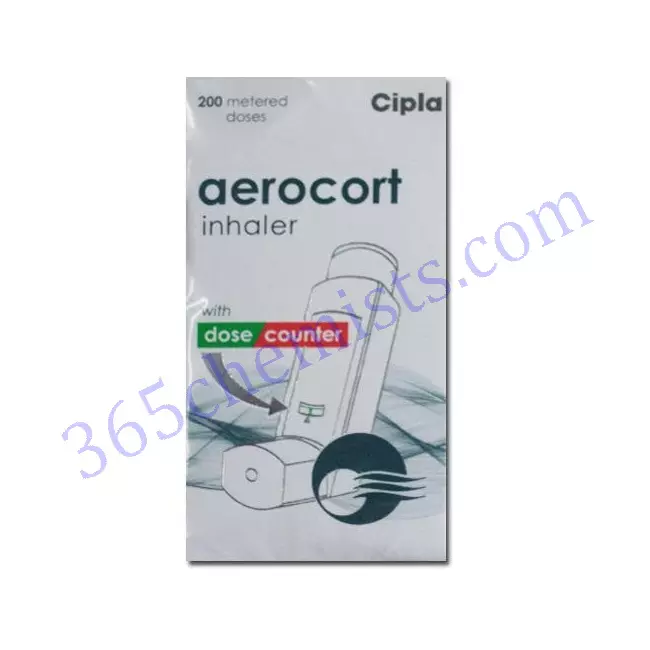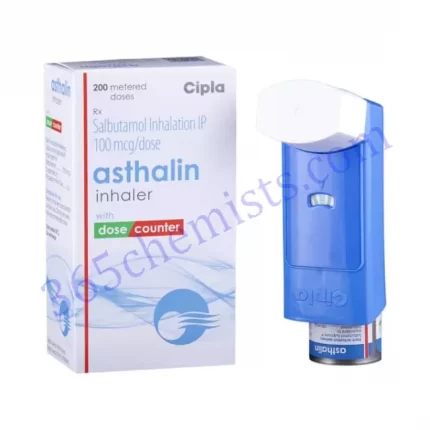Aerocort Inhaler (Beclometasone/Levosalbutamol): Dual Action for Asthma Management
The active ingredients in the combination medication known as Aerocort Inhaler are beclometasone and levosalbutamol. This medication comes in the form of an inhaler. The treatment of asthma and other respiratory conditions that are related to asthma frequently makes use of this substance. This detailed explanation of Aerocort Inhaler is intended to supply the reader with an extensive knowledge of the product, including its applications, recommended dosage, potential side effects, and other relevant information.
Dual Action for Asthma Management
The Aerocort Inhaler has a dual action, which makes it an effective tool for managing asthma. The anti-asthma medication beclometasone is a corticosteroid that works by lowering inflammation in the airways and preventing asthma symptoms such as wheezing, shortness of breath, and chest tightness. A bronchodilator, such as levosalbutamol, helps relax the muscles that line the airways, which in turn makes it easier to breathe. The use of these two medications together offers a comprehensive method for the treatment of asthma, as it addresses both the underlying inflammation as well as the symptoms that are manifesting right now.
Uses of Aerocort Inhaler
The primary indication for the administration of Aerocort Inhaler is the treatment of asthma, an ongoing respiratory condition that is characterised by recurrent episodes of wheezing, coughing, and breathlessness. It is also utilised in the treatment and prevention of bronchospasm that is brought on by physical activity. Aerocort offers relief from the acute symptoms of asthma and contributes to the overall management of the condition over the long term. It is essential to emphasise that the Aerocort Inhaler must be utilised under the direction and supervision of a qualified medical professional at all times.
Dosage and Administration
It is possible for the recommended dosage of Aerocort Inhaler to change based on the individual’s response to treatment as well as the severity of their asthma. It is essential to ensure that the dosage and administration instructions provided by your healthcare provider are strictly adhered to at all times. Inhaling the specified quantity of puffs from the inhaler is typically how it is used, as directed by your attending physician. Your specific requirements will serve as the basis for determining the appropriate dosage, as well as the number of times per day that it should be taken. For the best possible asthma control, it is essential to use the Aerocort Inhaler on a consistent basis and in the manner directed by your doctor.
Related Product
Aerocort Forte Rotacaps
Aerocort Rotacaps
Aerocort Inhaler
Precautions and Warnings
Before beginning treatment with Aerocort Inhaler, it is imperative that you discuss any preexisting medical conditions, such as heart conditions, high blood pressure, diabetes, or any medications that you are currently taking, with your healthcare provider. There is a possibility that this medication will interact negatively with other medications, or that it will not be appropriate for people who have certain medical conditions. It is essential, therefore, that you provide your doctor with a comprehensive list of all the medications that you are currently taking in order to avoid any potential adverse reactions caused by drug interactions. Additionally, before using Aerocort Inhaler, it is important to discuss the use of this product with your healthcare provider, especially if you are pregnant, have plans to become pregnant, or are breastfeeding.
Possible Side Effects
Although the Aerocort Inhaler is generally well tolerated, there is a possibility that it could cause certain adverse effects in some people. In addition to tremors, other common adverse effects include throat irritation, coughing, and headaches. These adverse effects are typically mild and fleeting in nature. In extremely unusual circumstances, more serious adverse effects, such as allergic reactions or a heightened heart rate, may manifest themselves. If you experience any side effects that are severe or continue for an extended period of time while using Aerocort Inhaler, it is imperative that you seek medical attention.
Storage and Handling
The Aerocort Inhaler should be kept at room temperature, protected from direct sunlight and moisture, and away from extreme temperatures. Make sure that both children and animals can’t get their hands on the inhaler. After the “expiration date” that is printed on the packaging of the Aerocort Inhaler, you should not use it. Follow the instructions provided by your local regulations for the disposal of waste for any inhaler that has been used but is no longer effective or has expired.
Conclusion
The combination of beclometasone and levosalbutamol found in the Aerocort Inhaler offers a dual-action strategy for effectively controlling asthma symptoms. Aerocort helps in controlling asthma symptoms and improving overall respiratory function. It does this by reducing inflammation in the airways and improving the relaxation of the bronchial muscles. It is imperative that you adhere to the recommended dosage, take the necessary precautions, and seek the guidance of your healthcare provider for individualised instructions. You’ll be able to take charge of your asthma management and experience an overall improvement in your quality of life when you use an Aerocort Inhaler.












